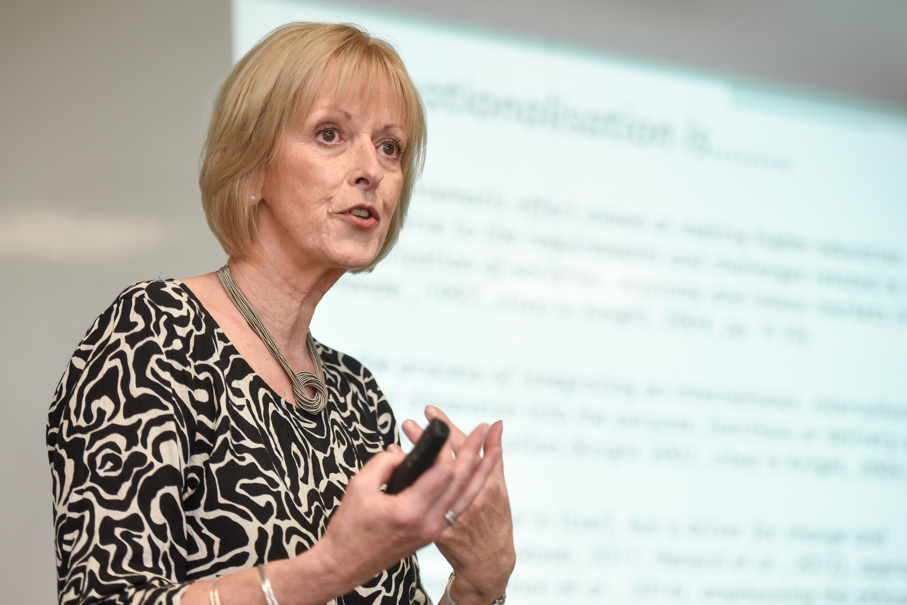Capacity building project in partnership with British Council intends to make the institution a national reference

Photo: Bruno Todeschini
Sue Robson claims that everyone in the institution has a role to play in internationalization
How should we go about internationalization at home? How should we enrich the university setting with cultural experiences other than academic mobility for some students and faculty? How to promote an international experience to those who cannot afford to travel and study abroad? This is a challenge for PUCRS, as it is now working on the internationalization of the curriculum. A project conceived by the British Council and headed by Professor Marilia Morosini, intends to make the institution a national reference in internationalization.
One of the steps of this process occurred from Nov 29 to Dec 1, at the University. Sponsored by the Higher Education Study Center, of the Graduate Program in Education, and by Newcastle University, from the UK, the event, which relied on the support of the Office of the Vice President for Academic Affairs, was offered by the British Council Capacity Building & Internationalisation for Higher Education. Several professors had the chance to take part in lectures and workshops in order to design the new model to be implemented at PUCRS in view of the national scenario. Prof. Dr Alexandre Guilherme, one of the exponents of the project, claims that in 2018 pilot projects in the School of Humanities’ undergraduate programs of Education and Letters and Business School’s Economics and Business Administration programs are expected to take off.
What is an international university?
During the training program, Professor Sue Robson, from Newcastle University, stated that everyone has a role to play when it comes to internationalization and it should encompass much more than academic mobility, as is the case in Brazil, or income generation, as is the case in many European countries, Australia and New Zealand. “I wonder if having a large number of international students is enough to grant a university the status of international. And having publications and joint research with international partners”, questions she. In her view, it is important to change the culture, learn new languages, explore new learning opportunities and sources of knowledge.
Sue claims that internationalization is about the preparation for life in a democratic society. As it is a decisive factor in an institution’s reputation, its proponents must take a step further and give it an intercultural perspective focused on ethical, social and academic goals of higher education.
For Newcastle Professor Joana Almeida, this process must take into consideration the national, regional, local and institutional scenarios. She added that PUCRS is qualified to assess the results of the internationalization strategies of the curriculum, in view of the elements – rather than magic formulas – brought forth by specialists from Newcastle. “Students will be the greatest beneficiaries of it. The adaptations must take into consideration the learning needs and different cultural backgrounds .” The event also featured Professor Steve Walsh, from the same institution.
Partnership
Earlier in May, PUCRS discussed internationalization at home during the seminar Internationalisation of Higher Education in the UK and Brazil: A partnership between Newcastle University and PUCRS, which served to consolidate the partnership between the institutions. Since 2016, a group of PUCRS researchers has been working together with Newcastle University.
The partnership will consolidate this partnership and is intended to discuss internationalization from British and Brazilian research networks; encourage reflection on both research and teaching and institutional practices through exchanges; and reinforce the connections, the production and the dissemination of knowledge on internationalization of Higher Education.